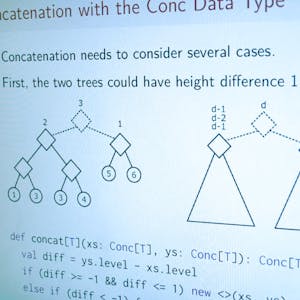Parallel programming
With every smartphone and computer now boasting multiple processors, the use of functional ideas to facilitate parallel programming is becoming increasingly widespread. In this course, you’ll learn the fundamentals of parallel programming, from task parallelism to data parallelism. In particular, you’ll see how many familiar ideas from functional programming map perfectly to to the data parallel paradigm. We’ll start the nuts and bolts how to effectively parallelize familiar collections operations, and we’ll build up to parallel collections, a production-ready data parallel collections library available in the Scala standard library. Throughout, we’ll apply these concepts through several hands-on examples that analyze real-world data, such as popular algorithms like k-means clustering.Learning Outcomes. By the end of this course you will be able to:
- reason about task and data parallel programs,
- express common algorithms in a functional style and solve them in parallel,
- competently microbenchmark parallel code,
- write programs that effectively use parallel collections to achieve performance
Recommended background: You should have at least one year programming experience. Proficiency with Java or C# is ideal, but experience with other languages such as C/C++, Python, Javascript or Ruby is also sufficient. You should have some familiarity using the command line. This course is intended to be taken after Functional Program Design in Scala: https://www.coursera.org/learn/progfun2
.
None
Syllabus
Syllabus - What you will learn from this course
Week 1
Parallel Programming
Week 2
Basic Task Parallel Algorithms
Week 3
Data-Parallelism
Week 4
Data Structures for Parallel Computing
FAQ
When will I have access to the lectures and assignments?
Access to lectures and assignments depends on your type of enrollment. If you take a course in audit mode, you will be able to see most course materials for free. To access graded assignments and to earn a Certificate, you will need to purchase the Certificate experience, during or after your audit. If you don't see the audit option:
What will I get if I subscribe to this Specialization?
When you enroll in the course, you get access to all of the courses in the Specialization, and you earn a certificate when you complete the work. Your electronic Certificate will be added to your Accomplishments page - from there, you can print your Certificate or add it to your LinkedIn profile. If you only want to read and view the course content, you can audit the course for free.
Is financial aid available?
Yes. In select learning programs, you can apply for financial aid or a scholarship if you can’t afford the enrollment fee. If fin aid or scholarship is available for your learning program selection, you’ll find a link to apply on the description page.
Reviews
excellent course, a good way to showcase how scala is well suited to patallel programming.
The course itself is very practical and the instructors are very knowledgeable
I learned a lot about parallel processing algorithms, way more than I expected. Even after spending over 10 years programming parallel data processing.
Very challenging course, the assignments are more about practising using parallel programming, would be better to design an assignment to implement the parallel programming.
The assignment could be optimized and avoid to be more academic since it may make student lost focus and spend too much time on the question itself rather than the parallel programming
